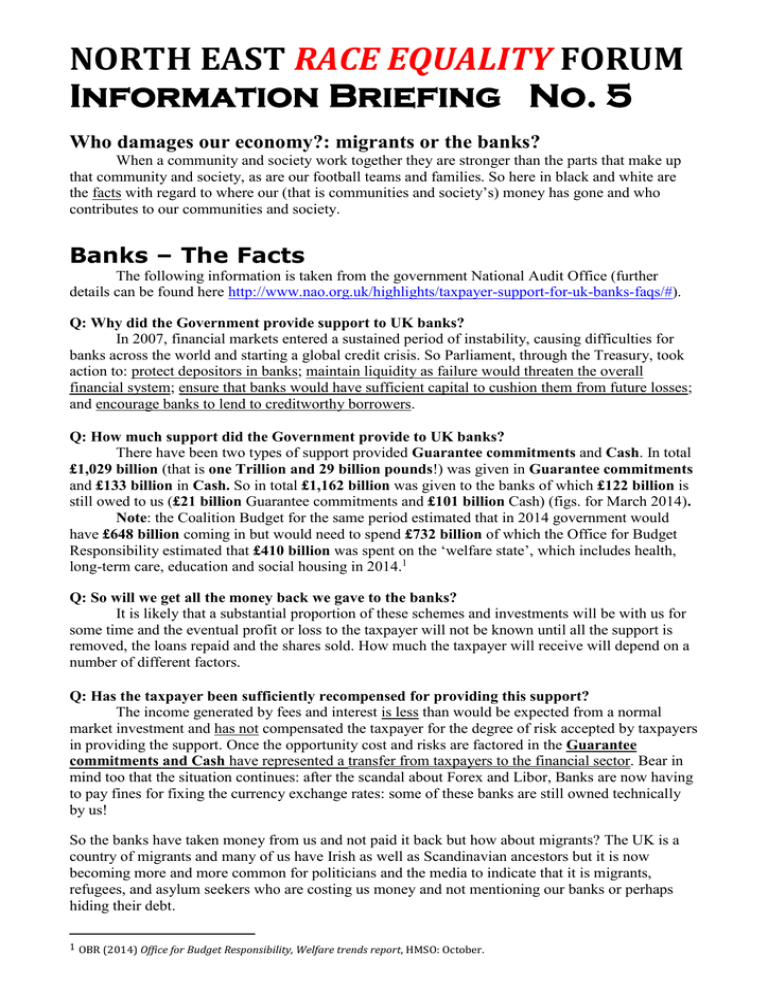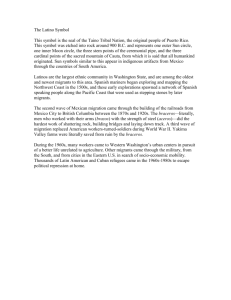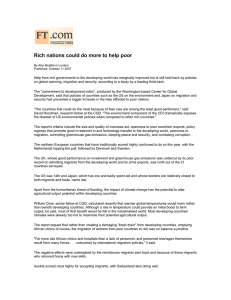NORTH EAST FORUM Information Briefing No. 5
advertisement

NORTH EAST RACE EQUALITY FORUM Information Briefing No. 5 Who damages our economy?: migrants or the banks? When a community and society work together they are stronger than the parts that make up that community and society, as are our football teams and families. So here in black and white are the facts with regard to where our (that is communities and society’s) money has gone and who contributes to our communities and society. Banks – The Facts The following information is taken from the government National Audit Office (further details can be found here http://www.nao.org.uk/highlights/taxpayer-support-for-uk-banks-faqs/#). Q: Why did the Government provide support to UK banks? In 2007, financial markets entered a sustained period of instability, causing difficulties for banks across the world and starting a global credit crisis. So Parliament, through the Treasury, took action to: protect depositors in banks; maintain liquidity as failure would threaten the overall financial system; ensure that banks would have sufficient capital to cushion them from future losses; and encourage banks to lend to creditworthy borrowers. Q: How much support did the Government provide to UK banks? There have been two types of support provided Guarantee commitments and Cash. In total £1,029 billion (that is one Trillion and 29 billion pounds!) was given in Guarantee commitments and £133 billion in Cash. So in total £1,162 billion was given to the banks of which £122 billion is still owed to us (£21 billion Guarantee commitments and £101 billion Cash) (figs. for March 2014). Note: the Coalition Budget for the same period estimated that in 2014 government would have £648 billion coming in but would need to spend £732 billion of which the Office for Budget Responsibility estimated that £410 billion was spent on the ‘welfare state’, which includes health, long-term care, education and social housing in 2014.1 Q: So will we get all the money back we gave to the banks? It is likely that a substantial proportion of these schemes and investments will be with us for some time and the eventual profit or loss to the taxpayer will not be known until all the support is removed, the loans repaid and the shares sold. How much the taxpayer will receive will depend on a number of different factors. Q: Has the taxpayer been sufficiently recompensed for providing this support? The income generated by fees and interest is less than would be expected from a normal market investment and has not compensated the taxpayer for the degree of risk accepted by taxpayers in providing the support. Once the opportunity cost and risks are factored in the Guarantee commitments and Cash have represented a transfer from taxpayers to the financial sector. Bear in mind too that the situation continues: after the scandal about Forex and Libor, Banks are now having to pay fines for fixing the currency exchange rates: some of these banks are still owned technically by us! So the banks have taken money from us and not paid it back but how about migrants? The UK is a country of migrants and many of us have Irish as well as Scandinavian ancestors but it is now becoming more and more common for politicians and the media to indicate that it is migrants, refugees, and asylum seekers who are costing us money and not mentioning our banks or perhaps hiding their debt. 1 OBR (2014) Office for Budget Responsibility, Welfare trends report, HMSO: October. Migrants – The Facts Q: Do immigrants pay their way? In 2005 the Institute for Public Policy Research2 used a combination of HM Treasury, the Labour Force Survey and its own calculations to estimate the net annual fiscal contribution of immigrants. It concluded that: “…the contribution of immigrants to public finances is growing …in 1999–2000 immigrants accounted for 8.8 per cent of government tax receipts and 8.4 per cent of government spending. By 2003–04 they accounted for 10.0 per cent and 9.1 per cent of government spending. Revenue from immigrants grew from £33.8 billion in 1999-00 to £41.2 billion in 2003– 04.” Following the 2004 accession of 8 countries to the EU, we have found that a large number of Central and Eastern European (CEE) workers have entered our labour market and communities. So how has that changed this contribution? In 2014 researchers3 calculated that those from CEE had still made a net annual fiscal contribution of £4.9 billion between 2001-2011, whilst those from other areas of Europe had made a £15.3 billion net annual contribution. Finally, they found that those from outside Europe (asylum seeks and refugees) had made a £5.2 billion net annual fiscal contribution. Q: But are new migrants not taking over our housing? New migrant communities are forming, particularly in the north of England where there is considerable under-occupied housing stock, and people certainly like to live in groups, as we do, for example in Spain and Turkey. But a recent investigation by the University of Oxford Migration Observatory4 found that not only were the foreign-born population less likely to own a home than the UK-born population but they were also almost three times as likely to be in the private rental sector. Further that UK-born compared to foreign-born individuals have slightly higher levels of participation in social housing. So it is a myth that migrants ‘jump’ social housing waiting lists. In fact a recent Joseph Rowntree Foundation piece of work5 found that immigrants living in privately rented housing were often in poor and exploitative conditions. Q: Yes but what about our welfare state? As we said, £410 billion was spent on the ‘welfare state’ in 2014. How much did migrants add to this cost. First, with the NHS, one of main accusations was ‘health tourism’ (including UKIP’s scaremongering about those seeking treatment for HIV) but the government6 itself noted that only 0.1% of NHS spending was due to ‘health tourism’. In fact most migrants are young and in good health and like the rest of us will not seek medical care until the latter stages of their lives. By then they will have paid substantial tax and national insurance. It is also a fact that the NHS is staffed, particularly at the dirty and difficult ends, by former migrants without whose work the NHs would collapse. Finally, in 2013, we were the only European Union country to have a lower unemployment rate for migrants (7.5%) than nationals (7.9%). In addition, of those migrants’ who were unemployed, only 1% claimed unemployment benefits compared to 4% of UK born unemployed7. If we are worried about migrants in the labour market, we should perhaps be more concerned with those who are hugely exploited with low wages and appalling conditions. 8 Contact: Special thanks and acknowledgement to Carole Parkins (Walking With) for her input to this contribution to the series. For further information about NEREF, earlier issues and ideas for further contributions to this series of Information Briefings, please contact gary.craig@durham.ac.uk The North East Race Equality Forum is a Network of individuals and organisations in the North East Region committed to promoting racial equality in the context of social justice. No one organisation is necessarily committed to every idea published in the name of the Forum. The Forum is supported by the ‘Race’, Crime and Justice Regional Research Network, which includes researchers from each University in the region. IPPR (2005) Paying their way: The fiscal contribution of immigrants in the UK, IPPR paper April 2005. Dustmann, C. and Frattini, T. (2014) “The Fiscal Effects of Immigration to the UK.” The Economic Journal 124: F593-F643. 4 http://www.migrationobservatory.ox.ac.uk/briefings/migrants-and-housing-uk-experiences-and-impacts 5 Perry, J. (2012) UK migrants and the private rented sector: A policy and practice report from the Housing and Migration Network, Joseph Rowntree Foundation. 6 Prederi (2013) Quantitative Assessment of Visitor and Migrant use of the NHS In England: Exploring the data, report for the Department of Health. 7 ICF GHK (2013) A fact finding analysis on the impact on the Member States' social security systems of the entitlements of nonactive intra- EU migrants to special non-contributory cash benefits and healthcare granted on the basis of residence, EU report. 8 See e.g. Geddes, A. et al. (2013) Forced labour in the United Kingdom, York: Joseph Rowntree Foundation. 2 3


